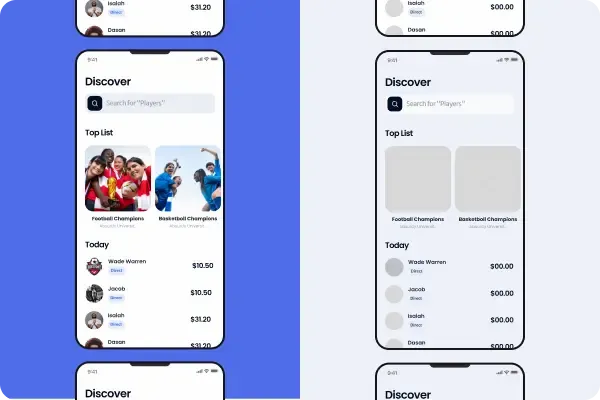We're all witnessing the massive demand for mobile applications these days. Forecasts predict a significant surge in downloads across all segments by 2027, maintaining a steady upward trajectory observed since 2019. It's no secret that users prefer them over web apps.
Why? Because mobile apps are simply more user-friendly and centered around the user's needs. They offer a smoother, more tailored experience, right at our fingertips. Whether it's shopping, connecting with friends, or finding information, mobile apps have become our go-to choice for convenience and ease of use.

As the demand for mobile apps skyrockets, developers are flooding the market. To stand out, we must prioritize creating apps that offer exceptional user experiences. But the road to seamless experiences is fraught with challenges—from keeping up with technology shifts to ensuring compatibility across devices.
Must have features of successful mobile application
8 Major Challenges in Mobile App Development
Let's delve into some of the most prominent app development challenges faced in mobile app development.
1- Ensuring Compatibility Across Devices: When creating a mobile app for your business, it's vital to ensure it works smoothly on all devices. Users expect the same experience whether they're using a phone or a tablet. If your app doesn't deliver, it could flop. People get frustrated with glitches and outdated looks. To sidestep these problems, pay attention to details like size, resolution, and how everything looks on different screens.
By doing this, you'll make sure your app delights users no matter what device they're using, boosting its chances of success.
Make your app compatible with different devices
2- User Interface and Experience: Creating a seamless user experience is one of most common mobile app development hurdles. It's all about making an app that users love using without any glitches. This involves designing a user interface (UI) that's easy to understand and looks great, while also ensuring fast loading times. These things are really important because if users struggle to use the app or it takes ages to load, they'll probably just move on to something else. For entrepreneurs, focusing on providing a flawless user experience is essential for making their app successful.

Best practices for Intuitive UX
3- Performance Optimization: This is the biggest challenge in developing mobile application, ensuring stellar performance alongside delivering a great user experience. A common hurdle lies in ensuring the app runs seamlessly without glitches or draining device resources. Early on, it's crucial to prioritize a design that functions smoothly across all devices. A high-performing app not only attracts more users but also keeps them engaged. Once you've conquered the testing phase, you're poised to create an app that truly stands out and makes a significant impact.
4- Security Concerns: With the increasing prevalence of cyber threats and data breaches, security has become a critical concern for mobile app developers. Protecting user data, implementing robust authentication mechanisms, and securing communications are paramount. However, ensuring security without compromising usability and performance is a delicate balancing act. Developers must stay updated on the latest security best practices and incorporate robust security measures from the outset of the development process.

5- Cross-Platform Development: Building native apps for both iOS and Android platforms separately can be time-consuming and resource-intensive. Cross-platform development frameworks such as React Native, Flutter, and Xamarin offer a promising solution by allowing developers to write code once and deploy it across multiple platforms. However, cross-platform development comes with its own set of challenges, including performance limitations, platform-specific nuances, and compatibility issues.
6- Continuous Integration and Deployment: The iterative nature of mobile app development necessitates efficient processes for continuous integration and deployment (CI/CD). Streamlining the build, test, and deployment pipeline is crucial for accelerating time-to-market and maintaining agility. Implementing automated testing, version control, and deployment pipelines can help mitigate risks and ensure the smooth delivery of updates and new features.
7- Choosing Outdated Technology: Developing a top-notch app comes with its hurdles, and one of the biggest pitfalls is choosing outdated technology. Before delving into app creation, thorough research is essential to determine the ideal technology stack. In today's bustling app ecosystem, where thousands of apps vie for attention, strive to not only match but surpass their efficacy. The goal should be to craft unique apps that shine in every aspect, delivering exceptional performance across the board.
8- User Feedback: User feedback is like gold for a mobile app—it tells us what users like, what's bothering them, and how we can make things better. But getting and understanding all that feedback can be overwhelming, especially as more people start using the app. We need good tools to collect and make sense of it all. And even then, figuring out which feedback to act on can be tough. Not all suggestions match our app's goals. To make the most of user feedback, developers need to really listen to what users are saying, gather feedback from different kinds of users, and use what they learn to keep improving the app, step by step.
How to collect user feedback for your mobile app.
Wrapping up
Challenges are part of the journey of Mobile app development. From ensuring apps work on all devices to keeping them running smoothly, there's a lot to tackle. But with a focus on user needs, staying updated on tech trends, and paying attention to feedback, developers can navigate these mobile app development challenges. With perseverance and a user-first mindset, they can create apps that truly stand out.
Frequently Asked Questions on Challenges in Mobile App Development
Ques: Why is user feedback important in mobile app development?
Ans: User feedback provides valuable insights into user preferences, pain points, and suggestions for improvement, helping developers refine and enhance their apps to better meet user needs and expectations.
Ques: What are some potential financing options for mobile app development?
Ans: Financing options for mobile app development may include seeking loans, attracting investors, forming joint ventures, or exploring crowdfunding platforms to secure the necessary funds for app development.
Ques: What's the key to optimizing app performance?
Ans: Prioritizing efficient coding, minimizing resource usage, and thorough testing help optimize app performance.
Ques: Why is testing important in mobile app development?
Ans: Testing ensures that the app functions correctly, delivering a seamless user experience.

